XIV century. Moscow enters the historical arena
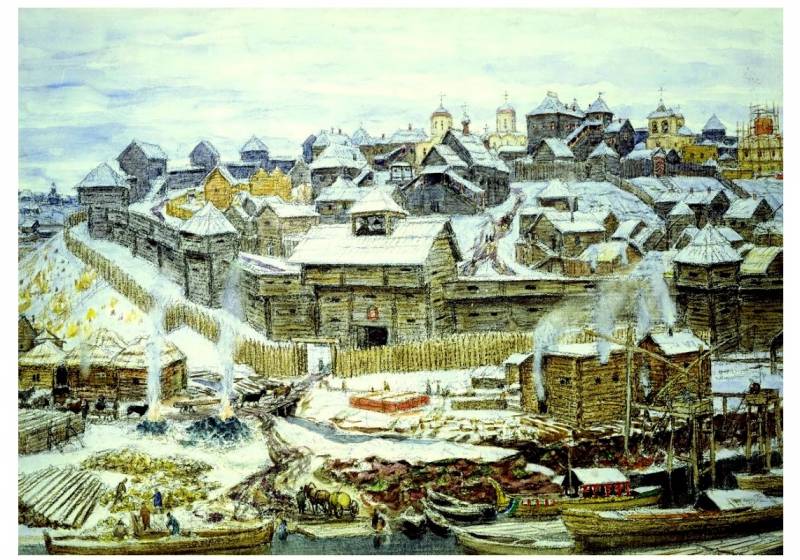
Kremlin under Ivan Kalita. Hood. A. Vasnetsov.
This article is about how and why Moscow stood at the head of the unification process of Rus'. I will not repeat facts known to most readers from school. We continue the theme of the emergence and formation of state institutions in Rus', which I wrote about in a number of previous articles.
After the Mongol invasion, new centers of power emerged in the northeast of Rus', first Tver, and then Moscow, which gained independence only at the end of the 1276th century under Daniil Alexandrovich (1303–XNUMX), the son of Alexander Nevsky.
How socio-economic relations developed during this period, in contrast to political ones, we know only in general terms, we simply have not received documents from this period.
The rise of Moscow
The dispute over the reasons for the rise of Moscow has been going on in science for a long time. Unlike rivals located right on the Volga, such as Tver and Nizhny Novgorod, Moscow stood clear of the waterways. It had scarce natural resources, good soils were only on the right side of the Moskva River, and there were no outstanding crafts in the Moscow region. But Moscow's periphery in relation to the old centers, Vladimir, Suzdal and Rostov, attracted people here from areas dangerous for raids, as the most important resource of the Middle Ages.
All Russian principalities, whose princes were called "great", went one historical by trial and error. There is no need to talk about any control system for this time.
In modern terms, it was a movement from a startup to a monopoly, where all other participants in the competitive struggle die in the struggle for it.
The Muscovite princes, participants in this struggle, at first only annexed, rounded up, defended and fought for their "court", their economy-the "state".
In 1301, Daniil Alexandrovich conquered Kolomna from Ryazan, when he died, the Pereslavl veche did not want to let his son Yuri go to Moscow, but he goes not just to another city where his father ruled, he goes to the "fatherland".
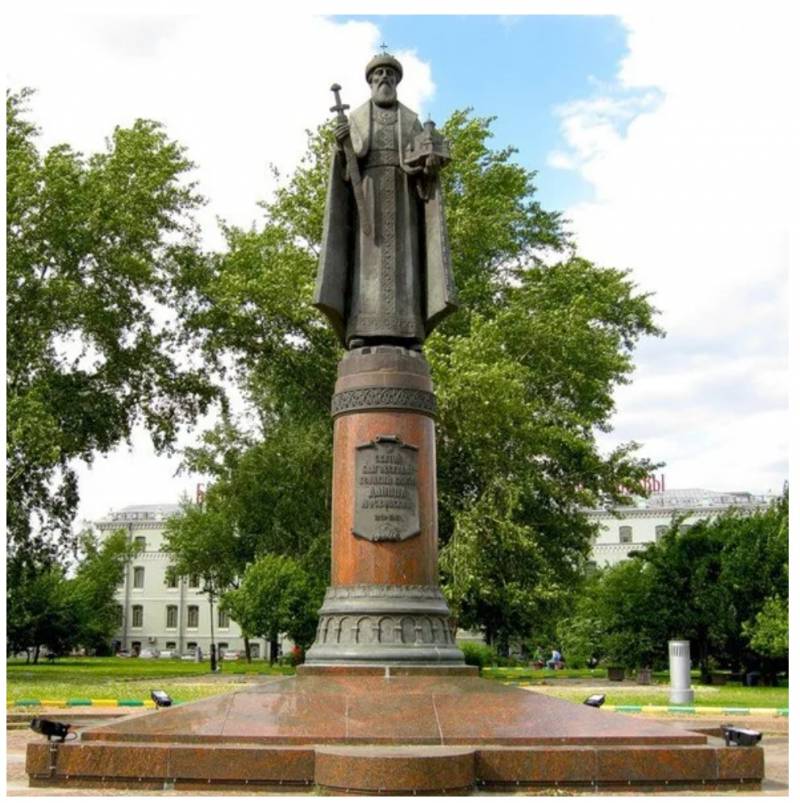
Monument to Prince Daniel Alexandrovich. Moscow. Authors: sculptors A. Korovin, V. Mokrousov, architect D. Sokolov.
In 1303, Mozhaisk was conquered from Smolensk, and the entire Moskva River was within the boundaries of his economy, which doubled. Yuri Danilovich (1303–1325) fought with varying degrees of success against Tver for the great reign of Vladimir. Mikhail Yaroslavovich Tverskoy makes several campaigns against Moscow and its allied Novgorod.
In 1313, a coup took place in the Horde, Uzbek came to power, who converted to Islam under the name of Muhammad. Yuri Danilovich took advantage of this, he married the sister of Uzbek and received a label for a great reign as a dowry. The strong prince of Tver, opposing this "unfair" decision, in 1317 defeated the Muscovites and their allies, the Tatars.
At the same time, Yuri's wife, Agafya, is captured, who, by an incomprehensible coincidence, dies in Tver. Yuri Danilovich took advantage of this, for which in 1318 the Tver prince Mikhail Yaroslavovich of Tverskoy was killed in the Horde, and the Moscow prince again received a label on the Vladimir table.
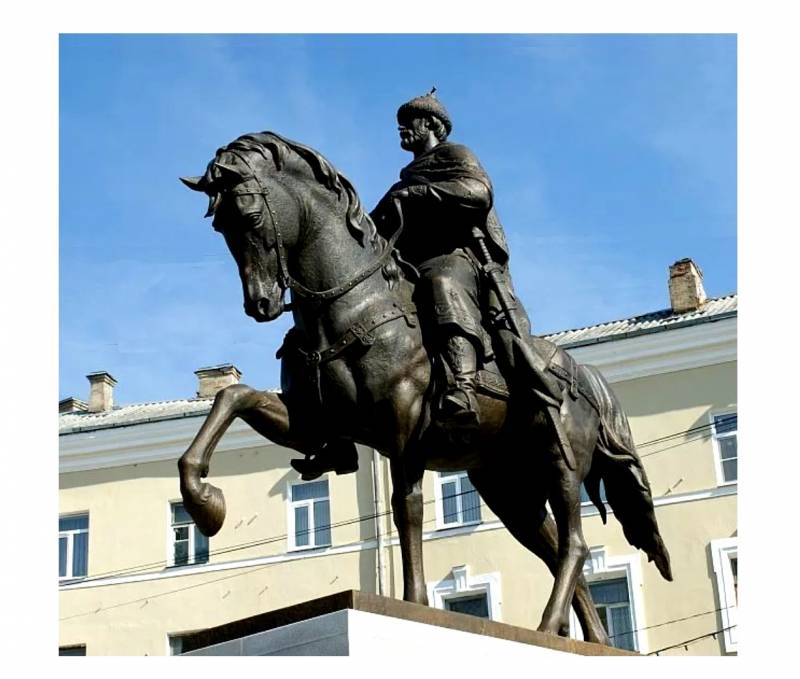
Monument to Prince of Tver and All Rus' Mikhail Yaroslavovich. Author A. N. Kovalchuk, Tver.
His son Dmitry Mikhailovich Terrible Eyes submits to Yuri and transfers the "tribute" from Tver to the Tatars. And Yuri, who went to Novgorod, did not send money to the Horde, for which he was deprived of the label. In 1325, the Tver prince Dmitry Mikhailovich Terrible Eyes in the Horde avenged his father by killing Yuri Danilovich.
Ivan Danilovich Kalita (1325-1349), who became the prince of Moscow after his brother Yuri, with the help of the Horde - "Fedorchuk's army" of 50 thousand horsemen, suppressed the veche performance in Tver and received a label for one half - the Vladimir table. The second half of northeastern Rus' with a label was received by Prince Alexander Vasilievich Suzdalsky.
The Tatars are closely watching to ensure that the Russians do not have a concentration of power in one hand, but Ivan Kalita becomes the main collector of the "Horde exit".
In 1325, Metropolitan Peter, who had previously been defended at the Church Council in Pereslavl-Zalessky by Muscovites, moved his cathedra from devastated Kiev to Moscow, and it became the spiritual center of all Rus', not without reason the Grand Dukes of Lithuania began a stubborn struggle for the return, and then for the creation own metropolis for southern and western Rus'.
At the same time, Ivan increases his possessions, capturing the cities of Uglich, Galich and Beloozero, and Tver becomes dependent on him. Moscow became the strongest and richest principality in the Vladimir land.
Ivan Kalita provided external and internal peace for his principality:
which in the conditions of the alarming fourteenth century was an extremely important measure for development.
His policy was continued by his sons Simeon the Proud (1340–1353) and Ivan the Red (1353–1359).
After the death of the latter, Moscow had to defend its positions under his young son Dmitry, the future Donskoy, against the three great princes, Tver, Ryazan and Suzdal-Nizhny Novgorod. The princely boyars played a special role here.
But the main merit in defending Moscow's interests belongs to Metropolitan Alexei, the son of the boyar Fyodor Byakont. He achieved a shortcut to the Grand Duchy of Vladimir for the young prince, as well as the right to collect a "way out" for the Horde, in the fight against the Suzdal prince. While civil strife began in the Horde, the "Great Jail".
The battle for hegemony in Rus'
In the 60s-70s. XIV century Moscow is fighting with Tver and its allied Lithuania for hegemony in the northeast and northwest of Rus'. The creation of a powerful modern stone fortress in Moscow in 1367 provided the city with security during the three campaigns of the Grand Duke of Lithuania Olgerd against Moscow - "Lithuanian".
In 1371, Mikhail Alexandrovich of Tverskoy, having received a label, in alliance with Lithuania and the Horde demanded submission from Dmitry Ivanovich, the same answered the following:
While the people of Vladimir, as in the heyday of city-states, did not recognize the new Grand Duke Mikhail Alexandrovich and did not let him in.
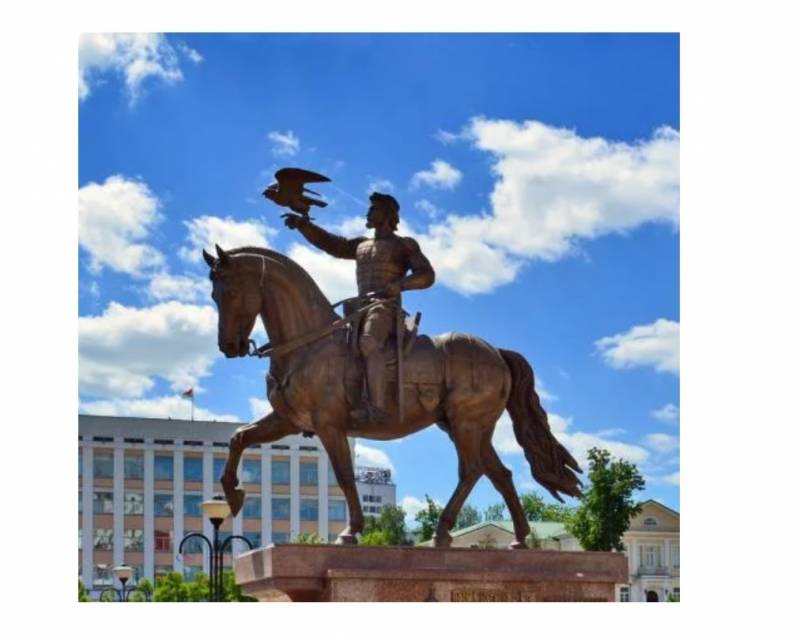
Monument to Olgerd. Author S. Bondarenko, Vitebsk. Belarus.
In the context of civil strife in the Horde, Moscow in 1371 was able to regain the label and reduce the amount of tribute. These concessions were made by the temnik Mamai, who usurped power in the Horde in order to secure a rear in the struggle for power in the steppe.
Finally, in 1375, after Dmitry’s campaign at the head of the army of all the principalities of the northeast and Novgorod to Tver, its Grand Duke Mikhail Alexandrovich recognized the Vladimir table as a “patrimony” or hereditary possession of Moscow. And himself - the "younger brother" of Dmitry, recognizing the "brother" of the specific prince of Moscow Vladimir Serpukhovsky. This put him on a par with the Moscow specific princes. In 1378, Dmitry captured the Horde city of Bulgar, took the cannons from there and put them in Moscow.
Moscow becomes the main city throughout the northeast, and part of the lands of western Rus' gravitate towards it: Smolensk, Chernihiv land, and even Kyiv. The Moscow princes secured the right to the grand princely table of Rus', and Moscow became the spiritual center of Orthodoxy in Eastern Europe:
Although the principalities in these territories remain independent or semi-independent, there is no talk of any unification into a “single state” yet. All subordination, as in the case of Tver, is still temporary, even brothers and uncles, appanage princes, are weakly subordinate. The state, as a single consolidated beginning, does not yet exist, there are princely "economy" of sovereigns.
Meanwhile, Mamai put things in order in the Golden Horde, demanded that all Russian principalities return to the old payments. Southern Rus' resumes payments. And Dmitry Ivanovich in 1380, after a series of clashes, having gathered the princely "yards" and the militia of most Russian cities, including southern Rus' and Novgorod, rejected Mamai's proposal to return to the amount of tribute from the time of Uzbek and moved troops to the Don.
At the same time, Mamai, given that Genghisid Tokhtamysh was at war with him, decided to first defeat the Moscow coalition. In turn, Dmitry Ivanovich sought to fight with Mamai, not allowing him to unite with the Ryazan prince Oleg and, which is especially important, with the great Lithuanian prince Jagiello (1362-1434). Sergey of Radonezh blessed the prince for the feat of arms.
On September 8, 1380, the Battle of Kulikovo took place. This battle showed the key role of Moscow in uniting Russian forces and indicated further ways to fight the Tatar-Mongol yoke. At this stage, the city militia still played a serious role, without which the victory on the Kulikovo field by the forces of some princely "courts" - squads would not have been possible.
In the same year, Tokhtamysh seized power in the Golden Horde, but Dmitry Donskoy did not go to the horde for a label. In retaliation, Tokhtamysh moved to Rus' in 1382, the Ryazan and Nizhny Novgorod principalities submitted to him. After the assault on Moscow failed, there were already cannons on the walls of Moscow, Tokhtamysh, through the princes of Nizhny Novgorod, convinced the Muscovites to surrender. The city was plundered, the inhabitants were killed and taken into slavery, the same fate befell other cities of the Moscow principality, on the way back the Tatars plundered the Ryazan land, despite the fact that Prince Oleg Ryazansky became their ally.
Moscow was heavily taxed. Under such conditions, an attempt begins to be made by some Russian lands to move away from Moscow. Strengthened Lithuania, whose Grand Duke Jagiello married the Polish Queen Jadwiga and became the head of Poland, establishes control over Smolensk (1386) and Polotsk (1387) allied to Moscow. And Novgorod even refused to participate in the payment of tribute to the Horde, for which in 1386 Dmitry made a campaign against him.
In 1389, Dmitry Ivanovich Donskoy dies, bequeathing to his son, Vasily, the grand princely Vladimir table already as a fiefdom, without reference to the khan's will. The question of the main center of Rus' was determined in fact and legally.
Vasily I (1389-1425) continued the policy of annexing lands and protecting his patrimony, his economy-"state". Not the state, as we understand it today, with the abstract concepts of Motherland-Fatherland, but as it was understood then. The term "state" did not exist. There was a legacy of the father - the fatherland or fatherland or his own household, with his free and involuntary servants. Next to the prince stood his "servants", the Moscow boyars and Metropolitan Cyprian.
The latter contributes to the marriage of Vasily to the daughter of the Grand Duke of Lithuania Vitovt - Sophia.
In 1392, the prince buys a label in the horde for the Nizhny Novgorod principality, as well as Meshchera, Tarusa, and Murom. In addition to everything, according to custom and "old times", the Nizhny Novgorod Veche approved the annexation to Moscow, and the Nizhny Novgorod boyars "in the old days" left their prince and went over to Vasily I.
The skillful policy of the Moscow princes, who used the situation to their advantage, the assistance of the townspeople, who understood the benefits of strengthening their city, the close-knit entourage of the prince, which consisted of boyars and princes-relatives, among whom the Grand Duke was the first among equals, all this contributed to the strengthening of Moscow.
Let us remember this important political moment: the first among equals.
Again, an alternative?
Now there is an opinion that the process of collecting lands in the west and south of Rus' by Lithuania was much milder than in Vladimir-Suzdal and adjacent lands. In the western and southern "principalities", we repeat, the military potential has weakened much more than in the northeast, and they were more striving for a "row" (agreement) with Lithuania, they did not try to fight on two fronts: both with Lithuania and with the Horde , as they say, out of two evils ... But as subsequent events show, due to the prevailing circumstances (the union of Lithuania and Poland), mechanisms of economic and religious exploitation came to these lands much more severe than in the northwest and northeast of Russia.
Within the framework of the neighboring community, the city-states are being replaced by a military-service proto-state, each individual Russian principality did not have the strength to resist Lithuania, and even more so the Horde, just as the northwestern city-states (Novgorod and Pskov) themselves could not cope with threat from the Order.
Why proto-state or early state?
Because, as we wrote in the previous article, its formation was just taking place and it was formed around the “princely court”, the princely economy and from the court. It is no coincidence that the terms “principality” and “state” appeared precisely in this period, the end of the XNUMXth - the beginning of the XNUMXth centuries, the first a little earlier, and not in the meaning that we use now, the principality was called only territory, volost.
There is no phenomenon - there is no term defining it either, because in ancient Rus' the “state” was called “land”, a territory ruled by a community, and not by an individual, a prince. Now the institution is being formed, and its name appears, so the princely court gives the name to the political structure: the state.
Forces to fight for independence
Only in the process of collecting, capturing and buying "lands", the Moscow sovereign gradually gathered forces that were able to measure themselves against the Horde. The victory at the Kulikovo field was secured by a temporary coalition force. Moscow itself could not cope with such a task, which was shown by the arrival of Tokhtamysh in 1382.
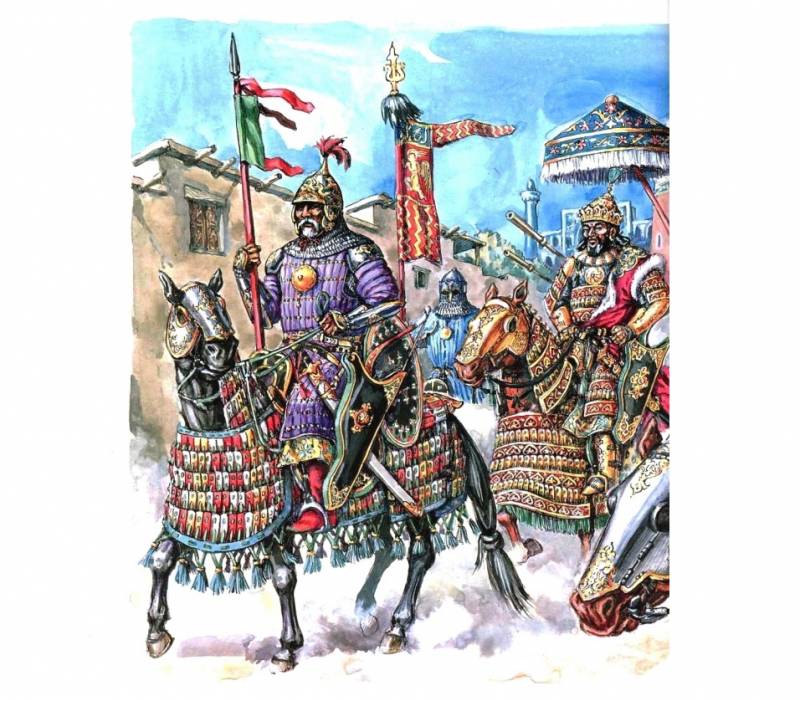
Departure of the Khan during the reign of Timur (Tamerlane) in Maverannakhr at the end of the XNUMXth - beginning of the XNUMXth centuries. The author of the reconstruction is M. V. Gorelik
Technically, enemy attacks always occurred suddenly, and the Grand Duke began to collect an army from all the lands belonging to Moscow only when nomads or Lithuanians crossed the border. So it was in 1368 during the raid of Olgerd and in 1395 during the “exile” (raid) of Oleg Ryazansky on Kolomna and the Tatars with the Suzdal prince on Nizhny Novgorod, as well as during the invasion of Edigey and his arrival to Moscow in 1408.
There were no border or permanent regiments, the collection of troops was already underway during a raid or invasion. Most often, the assembled army either pursued the enemy, who devastated the lands and led people into slavery, or made a retaliatory raid. Naturally, we are not talking about the Tatar nomad camps. To stop these threats, not combat "yards" were needed, but regiments of constant readiness and their provision was required.
Efforts aimed at concentrating resources eventually led to the victory over the Horde. This external force purposefully depleted the human and material resources of northeastern and northwestern Rus'. Therefore, the inhabitants of Nizhny Novgorod, who were constantly attacked from the south, decided at the veche to go under the patronage of a stronger Moscow prince.
Northeastern Rus' is still following the same path of organic development, there is no need to talk about any transition from the European to the Asian path. The external threat has introduced its harsh adjustments. The answer to this was the emergence of the structure of the military-service early state, as the only and uncontested system of defense of the Russian land, the crown of which was the creation of the early Russian state at the end of the XNUMXth century.
To be continued ...
Information